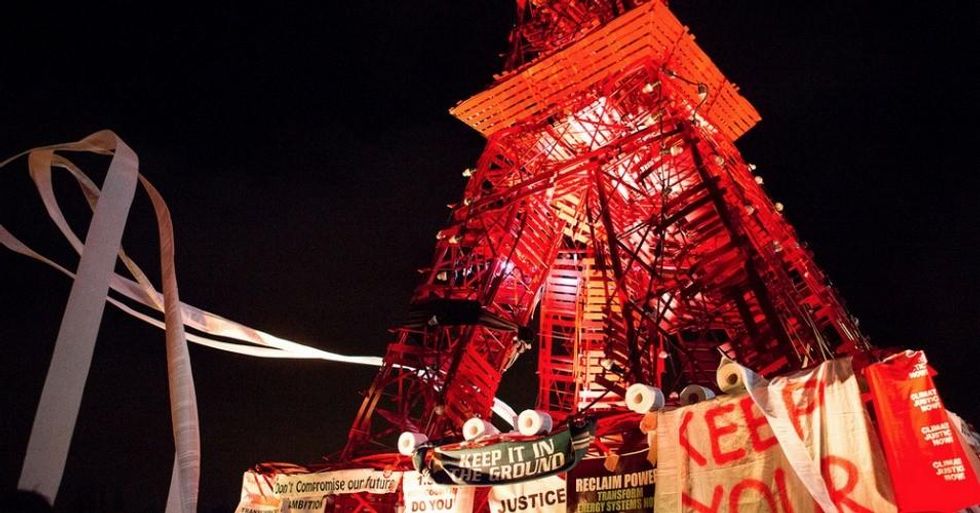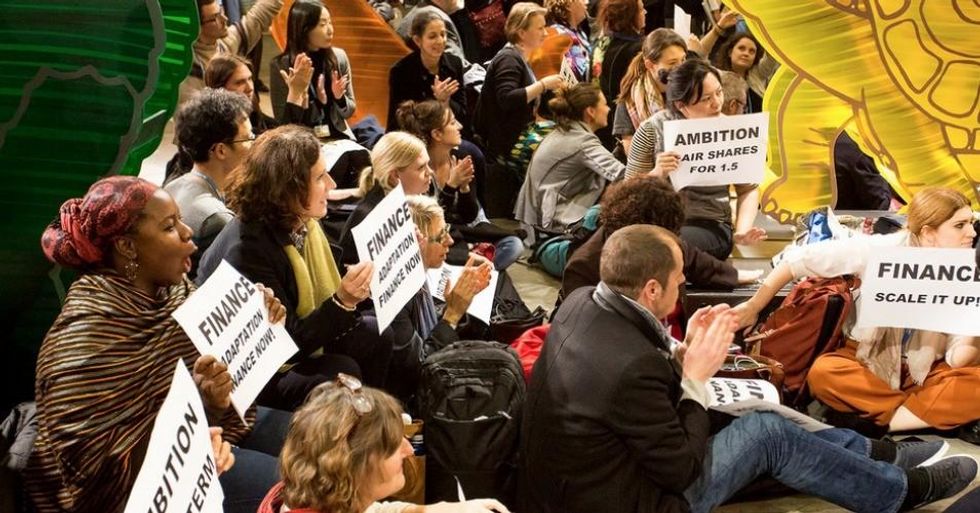

SUBSCRIBE TO OUR FREE NEWSLETTER
Daily news & progressive opinion—funded by the people, not the corporations—delivered straight to your inbox.
5
#000000
#FFFFFF
To donate by check, phone, or other method, see our More Ways to Give page.


Daily news & progressive opinion—funded by the people, not the corporations—delivered straight to your inbox.
Wednesday's release of a weak and vague draft climate deal touched off angry and energetic protests, including a large sit-in at the COP21 summit, where civil society and social movement groups from around the world demanded global leaders take the truly ambitious action necessary to address the climate crisis.
"Our governments must not settle for the draft text as it stands," said Sara Shaw, Friends of the Earth International climate justice and energy coordinator, in a press statement released Wednesday. "People on the frontline of climate change, who are already suffering as a result of climate change, demand that rich countries to do their fair share of emissions reductions and provide necessary finance for an energy transformation in Southern countries. The draft deal fails these frontline communities."
To the disappointment of global campaigners, the 29-page draft deal between representatives of 195 countries leaves numerous key climate demands unaddressed or unresolved. According to news reports and early analyses, the draft:
"Key demands like reparations for those who suffer irreparable losses and damages because of climate change are still highly contested in this draft," said Friends of the Earth International. "There is no agreement on finance. Developed countries are still planning to use a disproportionately large carbon budget, shirking their responsibilities and pushing the burden onto developing countries.'

Many who are rallying at the COP21 talks argue that, to truly take on the climate crisis, global societies must undergo a "just transition" away from fossil-fuel-dependent and environmentally-destructive economies altogether.
Some insist that the heavy role of multinational corporations at all levels of the COP21 negotiations is hampering real progress--and thus endangering people and the planet. "If there is a serious commitment to solving the climate crisis, governments would be working with peasants and other small-scale producers, rather than negotiating with corporations," declared the global peasant movement La Via Campesina.
Across the board, climate justice and environmental organizations responded to the latest draft deal with more than a hint of caution.
"Many of the main issues remain unresolved and lots is still up for grabs," Jamie Henn, strategy and communications director for the climate group 350.org told Common Dreams. "Paris is largely a fight to see how closely we can drag politicians towards reality. There's been real progress in seeing them recognize the necessity of the 1.5 degree target, but now we need them to operationalize it."
"Specifically, that means committing to getting off fossil fuels and transitioning to 100% renewable energy by 2050," said Henn. "The parties still haven't coalesced around a long term goal like that, so the issue is very much in play. Paris won't slow the march away from fossil fuels, but it could accelerate it. The clearer the commitments we can get over the next few days, the better. Either way, we'll be heading out with a clear directive: keep fossil fuels in the ground and continue the fight for climate justice."
With just days to go, it remains to be seen what the final deal will entail. "The negotiators are still grappling with major questions, and the theme to all of them is whether civil society or the fossil fuel industry will prevail in the end," Bill Snape, senior counsel to the Center for Biological Diversity and a fellow at American University Law School, told Common Dreams.

Dear Common Dreams reader, The U.S. is on a fast track to authoritarianism like nothing I've ever seen. Meanwhile, corporate news outlets are utterly capitulating to Trump, twisting their coverage to avoid drawing his ire while lining up to stuff cash in his pockets. That's why I believe that Common Dreams is doing the best and most consequential reporting that we've ever done. Our small but mighty team is a progressive reporting powerhouse, covering the news every day that the corporate media never will. Our mission has always been simple: To inform. To inspire. And to ignite change for the common good. Now here's the key piece that I want all our readers to understand: None of this would be possible without your financial support. That's not just some fundraising cliche. It's the absolute and literal truth. We don't accept corporate advertising and never will. We don't have a paywall because we don't think people should be blocked from critical news based on their ability to pay. Everything we do is funded by the donations of readers like you. Will you donate now to help power the nonprofit, independent reporting of Common Dreams? Thank you for being a vital member of our community. Together, we can keep independent journalism alive when it’s needed most. - Craig Brown, Co-founder |
Wednesday's release of a weak and vague draft climate deal touched off angry and energetic protests, including a large sit-in at the COP21 summit, where civil society and social movement groups from around the world demanded global leaders take the truly ambitious action necessary to address the climate crisis.
"Our governments must not settle for the draft text as it stands," said Sara Shaw, Friends of the Earth International climate justice and energy coordinator, in a press statement released Wednesday. "People on the frontline of climate change, who are already suffering as a result of climate change, demand that rich countries to do their fair share of emissions reductions and provide necessary finance for an energy transformation in Southern countries. The draft deal fails these frontline communities."
To the disappointment of global campaigners, the 29-page draft deal between representatives of 195 countries leaves numerous key climate demands unaddressed or unresolved. According to news reports and early analyses, the draft:
"Key demands like reparations for those who suffer irreparable losses and damages because of climate change are still highly contested in this draft," said Friends of the Earth International. "There is no agreement on finance. Developed countries are still planning to use a disproportionately large carbon budget, shirking their responsibilities and pushing the burden onto developing countries.'

Many who are rallying at the COP21 talks argue that, to truly take on the climate crisis, global societies must undergo a "just transition" away from fossil-fuel-dependent and environmentally-destructive economies altogether.
Some insist that the heavy role of multinational corporations at all levels of the COP21 negotiations is hampering real progress--and thus endangering people and the planet. "If there is a serious commitment to solving the climate crisis, governments would be working with peasants and other small-scale producers, rather than negotiating with corporations," declared the global peasant movement La Via Campesina.
Across the board, climate justice and environmental organizations responded to the latest draft deal with more than a hint of caution.
"Many of the main issues remain unresolved and lots is still up for grabs," Jamie Henn, strategy and communications director for the climate group 350.org told Common Dreams. "Paris is largely a fight to see how closely we can drag politicians towards reality. There's been real progress in seeing them recognize the necessity of the 1.5 degree target, but now we need them to operationalize it."
"Specifically, that means committing to getting off fossil fuels and transitioning to 100% renewable energy by 2050," said Henn. "The parties still haven't coalesced around a long term goal like that, so the issue is very much in play. Paris won't slow the march away from fossil fuels, but it could accelerate it. The clearer the commitments we can get over the next few days, the better. Either way, we'll be heading out with a clear directive: keep fossil fuels in the ground and continue the fight for climate justice."
With just days to go, it remains to be seen what the final deal will entail. "The negotiators are still grappling with major questions, and the theme to all of them is whether civil society or the fossil fuel industry will prevail in the end," Bill Snape, senior counsel to the Center for Biological Diversity and a fellow at American University Law School, told Common Dreams.

Wednesday's release of a weak and vague draft climate deal touched off angry and energetic protests, including a large sit-in at the COP21 summit, where civil society and social movement groups from around the world demanded global leaders take the truly ambitious action necessary to address the climate crisis.
"Our governments must not settle for the draft text as it stands," said Sara Shaw, Friends of the Earth International climate justice and energy coordinator, in a press statement released Wednesday. "People on the frontline of climate change, who are already suffering as a result of climate change, demand that rich countries to do their fair share of emissions reductions and provide necessary finance for an energy transformation in Southern countries. The draft deal fails these frontline communities."
To the disappointment of global campaigners, the 29-page draft deal between representatives of 195 countries leaves numerous key climate demands unaddressed or unresolved. According to news reports and early analyses, the draft:
"Key demands like reparations for those who suffer irreparable losses and damages because of climate change are still highly contested in this draft," said Friends of the Earth International. "There is no agreement on finance. Developed countries are still planning to use a disproportionately large carbon budget, shirking their responsibilities and pushing the burden onto developing countries.'

Many who are rallying at the COP21 talks argue that, to truly take on the climate crisis, global societies must undergo a "just transition" away from fossil-fuel-dependent and environmentally-destructive economies altogether.
Some insist that the heavy role of multinational corporations at all levels of the COP21 negotiations is hampering real progress--and thus endangering people and the planet. "If there is a serious commitment to solving the climate crisis, governments would be working with peasants and other small-scale producers, rather than negotiating with corporations," declared the global peasant movement La Via Campesina.
Across the board, climate justice and environmental organizations responded to the latest draft deal with more than a hint of caution.
"Many of the main issues remain unresolved and lots is still up for grabs," Jamie Henn, strategy and communications director for the climate group 350.org told Common Dreams. "Paris is largely a fight to see how closely we can drag politicians towards reality. There's been real progress in seeing them recognize the necessity of the 1.5 degree target, but now we need them to operationalize it."
"Specifically, that means committing to getting off fossil fuels and transitioning to 100% renewable energy by 2050," said Henn. "The parties still haven't coalesced around a long term goal like that, so the issue is very much in play. Paris won't slow the march away from fossil fuels, but it could accelerate it. The clearer the commitments we can get over the next few days, the better. Either way, we'll be heading out with a clear directive: keep fossil fuels in the ground and continue the fight for climate justice."
With just days to go, it remains to be seen what the final deal will entail. "The negotiators are still grappling with major questions, and the theme to all of them is whether civil society or the fossil fuel industry will prevail in the end," Bill Snape, senior counsel to the Center for Biological Diversity and a fellow at American University Law School, told Common Dreams.
